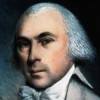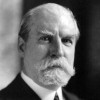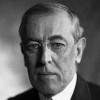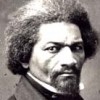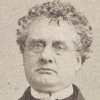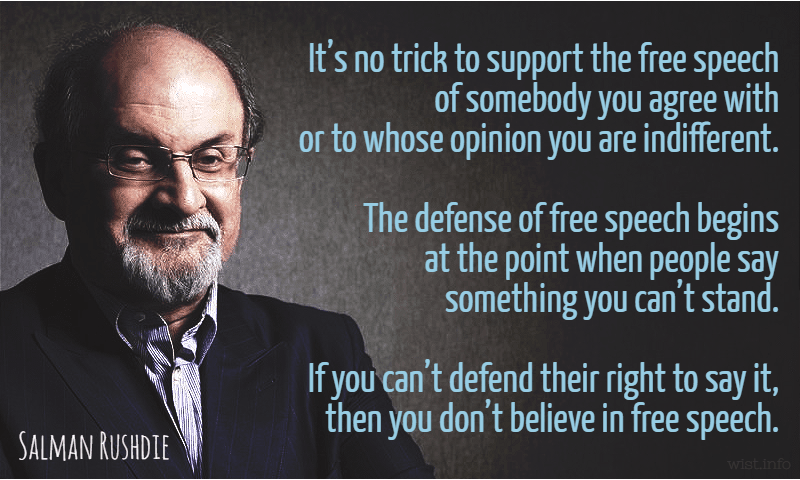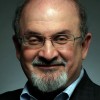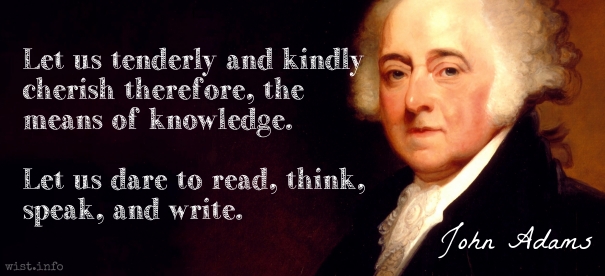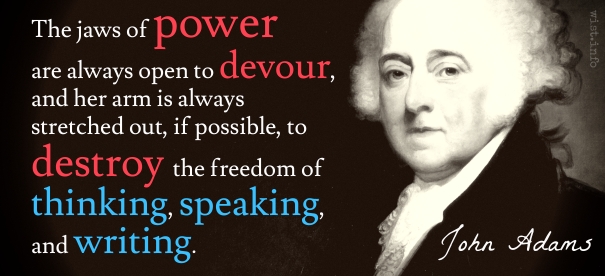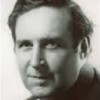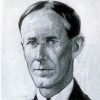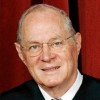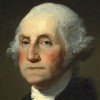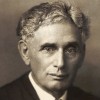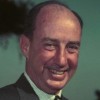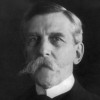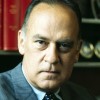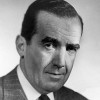Government by the people means that the people have the right to do their own thinking and to do their own speaking about their public servants. They must speak truthfully and they must not be disloyal to the country, and it is their highest duty by truthful criticism to make and keep the public servants loyal to the country.
Theodore Roosevelt (1858-1919) American politician, statesman, conservationist, writer, US President (1901-1909)
Essay (1918-04-06), “Citizens or Subjects?” Kansas City Star
(Source)
Regarding a bill which had just passed the Senate Judiciary Committee, which would fine and imprison any one who used "contemptuous or slurring language about the President."
This passage was added to later editions of his essay, "Lincoln and Free Speech,", as printed in The Works of Theodore Roosevelt, vol. 21, The Great Adventure, ch. 7 (1925). It does not appear in the original version of the essay or book.
Quotations about:
free speech
Note not all quotations have been tagged, so Search may find additional quotes on this topic.
What is going on in the Un-American Activities Committee worries me primarily because little people have become frightened and we find ourselves living in the atmosphere of a police state, where people close doors before they state what they think or look over their shoulders apprehensively before they express an opinion.
Eleanor Roosevelt (1884-1962) First Lady of the US (1933-45), politician, diplomat, activist
Column (1947-10-29), “My Day”
(Source)
In a self-governing country the people are called citizens. Under a despotism or autocracy the people are called subjects. This is because in a free country the people are themselves sovereign, while in a despotic country the people are under a sovereign. In the United States the people are all citizens, including its President. The rest of them are fellow citizens of the President. In Germany the people are all subjects of the Kaiser. They are not his fellow citizens, they are his subjects.
This is the essential difference between the United States and Germany, but the difference would vanish if we now submitted to the foolish or traitorous persons who endeavor to make it a crime to tell the truth about the Administration when the Administration is guilty of incompetence or other shortcomings. Such an endeavor is itself a crime against the nation. Those who take such an attitude are guilty of moral treason of a kind both abject and dangerous.Theodore Roosevelt (1858-1919) American politician, statesman, conservationist, writer, US President (1901-1909)
Essay (1918-04-06), “Citizens or Subjects?” Kansas City Star
(Source)
Regarding a bill which had just passed the Senate Judiciary Committee which would fine and imprison any one who used "contemptuous or slurring language about the President."
This passage was added to later editions of his essay, "Lincoln and Free Speech,", as printed in The Works of Theodore Roosevelt, vol. 21, The Great Adventure, ch. 7 (1925). It does not appear in the original version of the essay or book.
One thing is sure — none of the arts flourishes on censorship and repression. And by this time it should be evident that the American public is capable of doing its own censoring.
Eleanor Roosevelt (1884-1962) First Lady of the US (1933-45), politician, diplomat, activist
Column (1947-10-29), “My Day”
(Source)
In the future days, which we seek to make secure, we look forward to a world founded upon four essential human freedoms.
The first is freedom of speech and expression — everywhere in the world.
The second is freedom of every person to worship God in his own way — everywhere in the world.
The third is freedom from want — which, translated into world terms, means economic understandings which will secure to every nation a healthy peacetime life for its inhabitants — everywhere in the world.
The fourth is freedom from fear — which, translated into world terms, means a world-wide reduction of armaments to such a point and in such a thorough fashion that no nation will be in a position to commit an act of physical aggression against any neighbor — anywhere in the world.
That is no vision of a distant millennium. It is a definite basis for a kind of world attainable in our own time and generation. That kind of world is the very antithesis of the so-called new order of tyranny which the dictators seek to create with the crash of a bomb.Franklin Delano Roosevelt (1882-1945) American lawyer, politician, statesman, US President (1933-1945)
Speech (1941-01-06) to Congress, Annual Message (State of the Union), “Four Freedoms,” Washington, D. C.
(Source)
FDR's first presentation of his "Four Freedoms" framework.
Not only should there be complete liberty in matters of religion and opinion, but complete liberty for each man to lead his life as he desires, provided only that in so doing he does not wrong his neighbors.
Theodore Roosevelt (1858-1919) American politician, statesman, conservationist, writer, US President (1901-1909)
Speech (1910-04-23), “Citizenship in a Republic [The Man in the Arena],” Sorbonne, Paris
(Source)
It is a stifling, stultifying world in which to live. It is a world in which every word and every thought is censored. In England it is hard even to imagine such an atmosphere. Everyone is free in England; we sell our souls in public and buy them back in private, among our friends. But even friendship can hardly exist when every white man is a cog in the wheels of despotism. Free speech is unthinkable. All other kinds of freedom are permitted. You are free to be a drunkard, an idler, a coward, a backbiter, a fornicator; but you are not free to think for yourself. Your opinion on every subject of any conceivable importance is dictated for you by the pukka sahibs’ code.
George Orwell (1903-1950) English writer [pseud. of Eric Arthur Blair]
Burmese Days, ch. 5 (1934)
(Source)
Of the life of the Englishman John Flory, the protagonist, in Burma, part of the 1920s British Raj. Orwell's first novel, it was based on his own experiences as a police officer in that part of the word. The pukka sahibs were the "excellent fellows," i.e., the European (white) colonialists of the region.
The other threat to the security of our tradition, I believe, lies at home. It is the current fear of radical ideas and of people who propound them. I do not agree with extremists of either the left or the right, but I think they should be allowed to speak and to publish, both because they themselves have, and ought to have, rights, and once their rights are gone, the rights of the rest of us are hardly safe.
Jane Jacobs (1916-2006) American-Canadian journalist, author, urban theorist, activist
“No Virtue in Meek Conformity” (1952)
(Source)
Foreword to her response to a State Department Loyalty Security Board interrogatory (1952-03-25). Reprinted in Vital Little Plans (2016).
It is by the goodness of God that in our country we have those three unspeakably precious things: freedom of speech, freedom of conscience, and the prudence never to exercise either of them.
Mark Twain (1835-1910) American writer [pseud. of Samuel Clemens]
Following the Equator, ch. 20, Epigraph (1897)
(Source)
Cited as from Pudd'nhead Wilson's New Calendar. Sometimes misquoted "... never to practice either."
It is all right to say exactly what you think if you have learned to think exactly.
Marcelene Cox (1900-1998) American writer, columnist, aphorist
“Ask Any Woman” column, Ladies’ Home Journal (1945-11)
(Source)
Cox provided a variant of this aphorism in the 1959-01 issue of LHJ: "Anyone has the right to say what he thinks, if he thinks."
To whom do you award the right to decide which speech is harmful, or who is the harmful speaker? Or to determine in advance what are the harmful consequences going to be that we know enough about in advance to prevent? To whom would you give this job? To whom are you going to award the task of being the censor? Isn’t a famous old story that the man who has to read all the pornography, in order to decide what’s fit to be passed and what is fit not to be, is the man most likely to become debauched? Did you hear any speaker in the opposition to this motion, eloquent as one of them was, to whom you would delegate the task of deciding for you what you could read? To whom you would give the job of deciding for you — relieve you of the responsibility of hearing what you might have to hear? Do you know anyone? Hands up. Do you know anyone to whom you’d give this job? Does anyone have a nominee?
The civil rights of none shall be abridged on account of religious belief or worship, nor shall any national religion be established, nor shall the full and equal rights of conscience be in any manner, or on any pretext, infringed.
The people shall not be deprived or abridged of their right to speak, to write, or to publish their sentiments; and the freedom of the press, as one of the great bulwarks of liberty, shall be inviolable.
The people shall not be restrained from peaceably assembling and consulting for their common good; nor from applying to the Legislature by petitions, or remonstrances, for redress of their grievances.
James Madison (1751-1836) American statesman, political theorist, US President (1809-17)
Speech Introducing Proposed Constitutional Amendments (1789-06-08)
(Source)
Speech before the House of Representatives, proposing a Bill of Rights amending the US Constitution. This was the first draft of the text that would go on to become the First Amendment.
I find it difficult to see how talk about sex can be placed under the kind of censorship the Court here approves without subjecting our society to more dangers than we can anticipate at the moment. It was to avoid exactly such dangers that the First Amendment was written and adopted. For myself I would follow the course which I believe is required by the First Amendment, that is, recognize that sex at least as much as any other aspect of life is so much a part of our society that its discussion should not be made a crime.
Hugo Black (1886-1971) American politician and jurist, US Supreme Court Justice (1937-71)
Ginzburg v. United States, 383 U.S. 463, 482 (1966) [dissent]
(Source)
Since the earliest days, philosophers have dreamed of a country where the mind and spirit of man would be free; where there would be no limits to inquiry; where men would be free to explore the unknown and to challenge the most deeply rooted beliefs and principles. Our First Amendment was a bold effort to adopt this principle — to establish a country with no legal restrictions of any kind upon the subjects people could investigate, discuss, and deny.
Hugo Black (1886-1971) American politician and jurist, US Supreme Court Justice (1937-71)
James Madison Lecture, NYU School of Law (1960-02-17)
(Source)
The inaugural Madison lecture. Reprinted as "The Bill of Rights," NYU Law Review, Vol. 35 (Apr 1960)
History should teach us then, that in times of high emotional excitement minority parties and groups which advocate extremely unpopular social or governmental innovations will always be typed as criminal gangs and attempts will always be made to drive them out. It was knowledge of this fact, and of its great dangers, that caused the Founders of our land to enact the First Amendment as a guarantee that neither Congress nor the people would do anything to hinder or destroy the capacity of individuals and groups to seek converts and votes for any cause, however radical or unpalatable their principles might seem under the accepted notions of the time.
Hugo Black (1886-1971) American politician and jurist, US Supreme Court Justice (1937-71)
Barenblatt v. United States, 360 U.S. 109, 151 (1959) [dissent]
(Source)
Our Constitution assumes that the common sense of the people and their attachment to our country will enable them, after free discussion, to withstand ideas that are wrong. To say that our patriotism must be protected against false ideas by means other than these is, I think, to make a baseless charge. Unless we can rely on these qualities—if, in short, we begin to punish speech — we cannot honestly proclaim ourselves to be a free Nation and we have lost what the Founders of this land risked their lives and their sacred honor to defend.
Hugo Black (1886-1971) American politician and jurist, US Supreme Court Justice (1937-71)
Barenblatt v. United States, 360 U.S. 109, 146 (1959) [dissent]
(Source)
These rights may be abused by using speech or press or assembly in order to incite to violence and crime. The people, through their legislatures may protect themselves against that abuse. But the legislative intervention, can find constitutional justification only by dealing with the abuse. The rights themselves must not be curtailed.The greater the importance of safeguarding the community from incitements to the overthrow of our institutions by force and violence, the more imperative is the need to preserve inviolate the constitutional rights of free speech, free press and free assembly in order to maintain the opportunity for free political discussion, to the end that government may be responsive to the will of the people and that changes, if desired, may be obtained by peaceful means. Therein lies the security of the Republic, the very foundation of constitutional government.
Charles Evans Hughes, Sr. (1862-1948) American statesman, politician, Supreme Court Justice (1910-1916, 1930-1941)
De Jonge v. Oregon, 299 U.S. 353, 364-365 (1937) [majority]
(Source)
The First Amendment means to me, however, that the only constitutional way our Government can preserve itself is to leave its people the fullest possible freedom to praise, criticize or discuss, as they see fit, all governmental policies and to suggest, if they desire, that even its most fundamental postulates are bad and should be changed.
Hugo Black (1886-1971) American politician and jurist, US Supreme Court Justice (1937-71)
Barenblatt v. United States, 360 U.S. 109, 145-46 (1959) [dissent]
(Source)
A nation which, in the name of loyalty or of patriotism or of a sincere and high-sounding idea, discourages criticism and dissent, and puts a premium on acquiescence and conformity, is headed for disaster.
I have always been among those who believed that the greatest freedom of speech was the greatest safety, because if a man is a fool, the best thing to do is to encourage him to advertise the fact by speaking. It cannot be so easily discovered if you allow him to remain silent and look wise, but if you let him speak, the secret is out, and the world knows that he is a fool. So it is by the exposure of folly that it is defeated, not by the seclusion of folly, and, in this free air of free speech, men get into that sort of communication with one another which constitutes the basis of all common achievement.
Woodrow Wilson (1856-1924) US President (1913-20), educator, political scientist
Speech, Institute of France, Paris (10 May 1919)
(Source)
Equally clear is the right to hear. To suppress free speech is a double wrong. It violates the rights of the hearer as well as those of the speaker. It is just as criminal to rob a man of his right to speak and hear as it would be to rob him of his money.
Frederick Douglass (1817-1895) American abolitionist, orator, writer
“A Plea for Freedom of Speech in Boston” (9 Dec 1880)
(Source)
As President of our country and Commander-in-Chief of our military, I accept that people are going to call me awful things every day, and I will always defend their right to do so.
Barack Obama (b. 1961) American politician, US President (2009-2017)
Speech, United Nations (25 Sep 2012)
(Source)
“The right to think, to know and to utter,” as John Milton said, is the dearest of all liberties. Without this right, there can be no liberty to any people; with it, there can be no slavery.
John A. Andrew (1818-1867) American lawyer, politician, abolitionist
Letter (1860)
(Source)
Letter written after his election as Massachusetts governor. referencing Milton's Areopagitica. Quoted by Wendell Phillips in his "Mobs and Education" speech (16 Dec 1860), and often attributed to Phillips.
It’s no trick to support the free speech of somebody you agree with or to whose opinion you are indifferent. The defense of free speech begins at the point when people say something you can’t stand. If you can’t defend their right to say it, then you don’t believe in free speech.
Salman Rushdie (b. 1947) Indian novelist
“Do we have to fight the battle for the Enlightenment all over again?” The Independent (22 Jan 2005)
(Source)
Our loyalty is due entirely to the United States. It is due to the President only and exactly to the degree in which he efficiently serves the United States. It is our duty to support him when he serves the United States well. It is our duty to oppose him when he serves it badly.
Theodore Roosevelt (1858-1919) American politician, statesman, conservationist, writer, US President (1901-1909)
Essay (1918-04-06), “Citizens or Subjects?” Kansas City Star
(Source)
Regarding a bill which had just passed the Senate Judiciary Committee which would fine and imprison any one who used "contemptuous or slurring language about the President."
This passage was added to later editions of his essay, "Lincoln and Free Speech,", as printed in The Works of Theodore Roosevelt, vol. 21, The Great Adventure, ch. 7 (1925). It does not appear in the original version of the essay or book. See Roosevelt and Roosevelt.
Let us tenderly and kindly cherish, therefore, the means of knowledge. Let us dare to read, think, speak and write.
John Adams (1735-1826) American lawyer, Founding Father, statesman, US President (1797-1801)
Essay (1765-10-21), “A Dissertation on the Canon and the Feudal Law,” No. 4, Boston Gazette
(Source)
The jaws of power are always open to devour, and her arm is always stretched out, if possible, to destroy the freedom of thinking, speaking, and writing.
John Adams (1735-1826) American lawyer, Founding Father, statesman, US President (1797-1801)
Essay (1765-09-30), “A Dissertation on the Canon and the Feudal Law,” No. 3, Boston Gazette
(Source)
Originally written for the Sodalitas Club.
Whatever may be the immediate gains and losses, the dangers to our safety arising from political suppression are always greater than the dangers to that safety arising from political freedom. Suppression is always foolish. Freedom is always wise. That is the faith, the experimental faith, by which we Americans have undertaken to live. If we, the citizens of today, cannot shake ourselves free from the hysteria which blinds us to that faith, there is little hope for peace and security, either at home or abroad.
The remedy for speech that is false is speech that is true. This is the ordinary course in a free society. The response to the unreasoned is the rational; to the uninformed, the enlightened; to the straight-out lie, the simple truth.
.
I loved coming to the US in 1992, mostly because I loved the idea that freedom of speech was paramount. I still do. With all its faults, the US has Freedom of Speech. The First Amendment states that you can’t be arrested for saying things the government doesn’t like. You can say what you like, write what you like, and know that the remedy to someone saying or writing or showing something that offends you is not to read it, or to speak out against it. I loved that I could read and make my own mind up about something.
Neil Gaiman (b. 1960) British author, screenwriter, fabulist
Blog entry (2008-12-01), “Why defend freedom of icky speech?”
(Source)
How important are free speech and satire? Important enough that people will murder others to silence the kind of speech they don’t like.
Neil Gaiman (b. 1960) British author, screenwriter, fabulist
Twitter (7 Jan 2014)
(Source)
Regarding the mass murder at the Charlie Hebdo magazine in Paris.
If Men are to be precluded from offering their Sentiments on a matter, which may involve the most serious and alarming consequences, that can invite the consideration of Mankind, reason is of no use to us; the freedom of Speech may be taken away, and dumb and silent we may be led, like sheep, to the Slaughter.
George Washington (1732-1799) American military leader, Founding Father, US President (1789-1797)
Speech to the Officers at Newburgh (15 Mar 1783)
(Source)
I believe in an America where the rights that I have described are enjoyed by all, regardless of their race or their creed or their national origin — where every citizen is free to think and speak as he pleases and write and worship as he pleases — and where every citizen is free to vote as he pleases, without instructions from anyone, his employer, the union leader or his clergyman.
Everyone is in favor of free speech. Hardly a day passes without its being extolled, but some people’s idea of it is that they are free to say what they like, but if anyone says anything back, that is an outrage.
Winston Churchill (1874-1965) British statesman and author
Debate, House of Commons (13 Oct 1943)
(Source)
More discussion of this quotation: If Anyone Says Anything Back, That Is an Outrage – Quote Investigator.
To learn who rules over you, simply find out who you are not allowed to criticize.
Voltaire (1694-1778) French writer [pseud. of Francois-Marie Arouet]
(Misattributed)
Frequently attributed to Voltaire in memes, but unsourced in any of his writings. More accurately attributed to Kevin Alfred Strom during a 1993 anti-semitic screed on a radio broadcast:To determine the true rulers of any society, all you must do is ask yourself this question: Who is it that I am not permitted to criticize?
More discussion of the attribution here, here and here.
We believe very strongly on preserving the right to differ in this country, and the right to dissent; and if I have done a good job of anything since I’ve been president, it’s to ensure that there are plenty of dissenters.
Lyndon B. Johnson (1908-1973) American politician, educator, US President (1963-69)
Press Conference (1967-11-17)
(Source)
Video:
Certainly the First Amendment’s language leaves no room for inference that abridgments of speech and press can be made just because they are slight. That Amendment provides, in simple words, that “Congress shall make no law … abridging the freedom of speech, or of the press.” I read “no law … abridging” to mean no law abridging.
Hugo Black (1886-1971) American politician and jurist, US Supreme Court Justice (1937-71)
Smith v. California, 361 U.S. 147, 157 (1959) [concurring]
(Source)
Those who won our independence by revolution were not cowards. They did not fear political change. They did not exalt order at the cost of liberty. To courageous, self-reliant men, with confidence in the power of free and fearless reasoning applied through the processes of popular government, no danger flowing from speech can be deemed clear and present, unless the incidence of the evil apprehended is so imminent that it may befall before there is opportunity for full discussion. If there be time to expose through discussion the falsehood and fallacies, to avert the evil by the processes of education, the remedy to be applied is more speech, not enforced silence.
Louis Brandeis (1856-1941) American lawyer, activist, Supreme Court Justice (1916-39)
Whitney v California, 274 US 357, 377 (1927) (concurring)
(Source)
The show in general we feel like is a privilege. Even the idea that we can sit in the back of the country and make wise cracks … which is really what we do. We sit in the back and throw spitballs — but never forgetting that it is a luxury in this country that allows us to do that. That is, a country that allows for open satire, and I know that sounds basic and it sounds like it goes without saying. But that’s really what this whole situation is about. It’s the difference between closed and open. The difference between free and … burdened. And we don’t take that for granted here, by any stretch of the imagination.
Jon Stewart (b. 1962) American satirist, comedian, and television host. [b. Jonathan Stuart Leibowitz]
The Daily Show (2001-09-20)
(Source)
The sound of tireless voices is the price we pay for the right to hear the music of our own opinions. But there is also, it seems to me, a moment at which democracy must prove its capacity to act. Every man has a right to be heard; but no man has the right to strangle democracy with a single set of vocal chords.
Adlai Stevenson (1900-1965) American diplomat, statesman
Speech (1952-08-28), “Faith in Liberalism,” State Committee of the Liberal Party, New York City
(Source)
You ask, What makes it worth defending? and the only answer I can give is this: Freedom to write, freedom to read, freedom to own material that you believe is worth defending means you’re going to have to stand up for stuff you don’t believe is worth defending, even stuff you find actively distasteful, because laws are big blunt instruments that do not differentiate between what you like and what you don’t, because prosecutors are humans and bear grudges and fight for re-election, because one person’s obscenity is another person’s art. Because if you don’t stand up for the stuff you don’t like, when they come for the stuff you do like, you’ve already lost.
Neil Gaiman (b. 1960) British author, screenwriter, fabulist
Blog entry (2008-12-01), “Why defend freedom of icky speech?”
(Source)
I have been one of those who have carried the fight for complete freedom of information in the United Nations. And while accepting the fact that some of our press, our radio commentators, our prominent citizens and our movies may at times be blamed legitimately for things they have said and done, still I feel that the fundamental right of freedom of thought and expression is essential. If you curtail what the other fellow says and does, you curtail what you yourself may say and do.
Eleanor Roosevelt (1884-1962) First Lady of the US (1933-45), politician, diplomat, activist
Column (1947-10-29), “My Day”
(Source)
On the House Un-American Activities Committee.
It is not only in war, however, that we fight for freedom. One fights for freedom in personal contacts and in many phases of civilian life. When the war is over, the four freedoms will not have been won, we shall simply have dominated their more aggressive enemies. At all times, day by day, we have to continue fighting for freedom of religion, freedom of speech, freedom from fear, and freedom from want — for these are things that must be gained in peace as well as in war. At all times, day by day, we have to continue fighting for freedom of religion, freedom of speech, and freedom from want — for these are things that must be gained in peace as well as in war.
Eleanor Roosevelt (1884-1962) First Lady of the US (1933-45), politician, diplomat, activist
Column (1943-04-15), “My Day”
(Source)
The first principle of a free society is an untrammeled flow of words in an open forum.
Adlai Stevenson (1900-1965) American diplomat, statesman
Speech (1961-01-18), US Senate Committee on Foreign Relations, Washington, DC
(Source)
Statement given by Stevenson after his nomination by President-elect Kennedy to be ambassador to the United Nation, which office he held until his death in 1965. The speech (or this passage) is often cited to the New York Times coverage of it the following day, though often mistakenly dating it in 1962.
In context, he is addressing criticisms of the UN as a "debating society," noting that the US Congress often serves as such, from which he extends this principle.
The most stringent protection of free speech would not protect a man in falsely shouting fire in a theatre and causing a panic.
Oliver Wendell Holmes, Jr. (1841-1935) American jurist, Supreme Court Justice
Schenck v. United States (3 Mar 1919)
(Source)
Freedom to discuss public affairs and public officials is unquestionably, as the Court today holds, the kind of speech the First Amendment was primarily designed to keep within the area of free discussion. To punish the exercise of this right to discuss public affairs or to penalize it through libel judgments is to abridge or shut off discussion of the very kind most needed. This Nation, I suspect, can live in peace without libel suits based on public discussions of public affairs and public officials. But I doubt that a country can live in freedom where its people can be made to suffer physically or financially for criticizing their government, its actions, or its officials.
Hugo Black (1886-1971) American politician and jurist, US Supreme Court Justice (1937-71)
New York Times Co. v. Sullivan, 376 U.S. 254, 296-297 (1964) [concurring]
(Source)
Patriotism means to stand by the country. It does not mean to stand by the President or any other public official save exactly to the degree in which he himself stands by the country. It is patriotic to support him in so far as he efficiently serves the country. It is unpatriotic not to oppose him to the exact extent that by inefficiency or otherwise he fails in his duty to stand by the country. In either event, it is unpatriotic not to tell the truth — whether about the President or about any one else.
Theodore Roosevelt (1858-1919) American politician, statesman, conservationist, writer, US President (1901-1909)
Essay (1918-05), “Lincoln and Free Speech,” Metropolitan Magazine, Vol. 47, No. 6
(Source)
On war-time censorship by the Wilson Administration taken against critics of its handling of war efforts.
Reprinted in Appendix C of his The Great Adventure (1918), and as ch. 7 of that book in Vol. 21 of The Works of Theodore Roosevelt (1925), The Great Adventure.
See also Roosevelt and Roosevelt.
First as to Speech. That privilege rests upon the premise that there is no proposition so uniformly acknowledged that it may not be lawfully challenged, questioned, and debated. It need not rest upon the further premise that there are no propositions that are not open to doubt; it is enough, even if there are, that in the end it is worse to suppress dissent than to run the risk of heresy.
Learned Hand (1872-1961) American jurist
“The Guardians,” Oliver Wendell Holmes Lecture #3, Harvard University (1958)
(Source)
Speaking of the First Amendment to the US Constitution.
Censorship reflects a society’s lack of confidence in itself. It is a hallmark of an authoritarian regime. Long ago, those who wrote our First Amendment charted a different course. They believed a society can be truly strong only when it is truly free. In the realm of expression, they put their faith, for better or for worse, in the enlightened choice of the people, free from the interference of a policeman’s intrusive thumb or a judge’s heavy hand. So it is that the Constitution protects coarse expression as well as refined, and vulgarity no less than elegance. A book worthless to me may convey something of value to my neighbor. In the free society to which our Constitution has committed us, it is for each to choose for himself.
Potter Stewart (1915-1985) US Supreme Court Justice (1959-81)
Ginzburg v. United States, 383 U.S. 463, 498 (1966) [dissenting]
(Source)
The First Amendment is often inconvenient. But that is beside the point. Inconvenience does not absolve the government of its obligation to tolerate speech.
Anthony Kennedy (b. 1936) US Supreme Court Justice
International Society for Krishna Consciousness v. Lee, 505 U.S. 672 (26 Jun 1992) [concurring[
(Source)
The Framers knew, better perhaps than we do today, the risks they were taking. They knew that free speech might be the friend of change and revolution. But they also knew that it is always the deadliest enemy of tyranny. With this knowledge they still believed that the ultimate happiness and security of a nation lies in its ability to explore, to change, to grow and ceaselessly to adapt itself to new knowledge born of inquiry free from any kind of governmental control over the mind and spirit of man. Loyalty comes from love of good government, not fear of a bad one.
Hugo Black (1886-1971) American politician and jurist, US Supreme Court Justice (1937-71)
James Madison Lecture, NYU School of Law (1960-02-17)
(Source)
The inaugural Madison lecture. Reprinted as "The Bill of Rights," NYU Law Review, Vol. 35 (Apr 1960).
If liberty means anything at all it means the right to tell people what they do not want to hear.
George Orwell (1903-1950) English writer [pseud. of Eric Arthur Blair]
Animal Farm, unpublished preface (1945)
(Source)
The original essay was written in 1945 as an introduction to the first edition of the book, but was left unpublished It was rediscovered in 1971, and finally published under Orwell's name as "The Freedom of the Press," Times Literary Supplement [of London] (1972-09-15).
More history of this quotation here: If Liberty Means Anything At All It Means the Right To Tell People What They Do Not Want To Hear – Quote Investigator®.
My view is, without deviation, without exception, without any ifs, buts or whereases, that freedom of speech means that you shall not do something to people either for the views they have or the views they express or the words they speak or write.
Hugo Black (1886-1971) American politician and jurist, US Supreme Court Justice (1937-71)
Interview by Edmond Cahn, New York University Law School (1962)
Published in "Mr. Justice Black and First Amendment Absolutes: A Public Interview," New York University Law Review 37 (1962): 549, and referenced in "Minority Opinion," Time (1962-06-22).
Black reiterated his absolutist point in his third Carpentier Lecture at Columbia University (1968-03-21), collected in A Constitutional Faith (1968):My view is, without deviation, without exception, without any ifs, buts or whereases, that freedom of speech means that government shall not do anything to people, or, in the words of the Magna Carta, move against people, either for the views they have or the views they express or the words they speak or write.
We must not confuse dissent with disloyalty.
Edward R. Murrow (1908-1965) American journalist
Commentary (1954-03-09), “A Report on Senator Joseph R. McCarthy,” See It Now, CBS TV
(Source)
(Source (Video)). Episode dealing with Sen. Joe McCarthy's witch hunt of Communists in the US.










